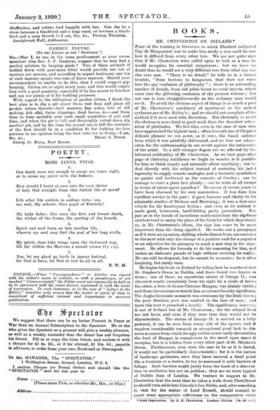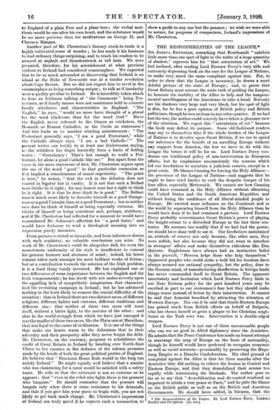BOOKS.
MR. CHESTERTON ON IRELAND.*
PART of the training in literature to which Flaubert subjected Guy de igaupassant was to make him study a tree until he saw how it differed from every other tree. We are not quite sure that if Mr. Chesterton were called upon to look at a tree he would recognize its essential uniqueness ; but we have no doubt that he would see a very different tree from what any one else ever saw. "There is no detail," he tells us in a former treatise, "from buttons to kangaroos, that does not enter into the gay confusion of philosophy " ; there is an astounding number of details, from red pillar-boxes to coral insects, which enter into the glittering confusion of the present volume ; but not one is seen straightforwardly as the ordinary man would see it, To avoid the obvious aspect of things is as much a part of Mr. Cliesterton's machinery of merriment as the arched eyehrowsare of Mr. Robey's ; and we should not complain of the method if it were used with discretion. But obviously to avoid the obvious is more fatal to good work than the dreariest reiter- ation of platitudes. We feel this, even in the ease of men who have approached the highest rank ; often beneath one of Chopin's delicate phrases we can scent, as it were, the banal cadence from which it was painfully elaborated, and we lose our admir- ation for the craftsmanship in our revolt against the insincerity of the artist. In a still stronger degree are we affected by the laboured artificiality of Mr. Chesterton. As we turn page after page of clattering antitheses we begin to wonder is it possible for him to think simply and naturally about anything ; can he deal directly with his subject instead of torturing his jaded ingenuity to supply remote analogies and a fantastic symbolism as quaint and irrelevant as the conceits of Cowley ; can he manage to state a plain fact plainly ; can he write at all except in terms of extravagant paradox ? He seems of recent years to have been obsessed by his own mannerism. It has done him excellent service in the past : it gave humour and clarity to his admirable studies of Dickens and Browning ; it was a first-rate vehicle for his flamboyant fiction ; and even at its noisiest it made good, boisterous, hard-hitting party journalism. But just as in the hands of incautious mathematicians the algebraic symbols tend to usurp the place of the facts for which they stand, so, in Mr. Chesterton's idiom, the sign has come to be more important than the thing signified. He works out a paragraph as if it were an equation, shifting whole clauses from one sentence to the next with only the change of a positive verb for a negative or an adjective for its antonym to mark a new step in the argu- ment. He allows his formula to do his reasoning for him, and makes an elaborate parade of logic without securing its reality. He can still be eloquent, but he cannot be accurate ; he is often inspiring, but rarely sane.
He begins his book on Ireland by telling how he wandered into St. Stephen's Green in Dublin, and there found two figures in stone ; one of these, an equestrian statue of George II., was obscured nearly completely from his sight by a circle of trees ; the other, a bust of James Clarence Mangan, was plainly visible; and these circumstances struck him as extraordinarily significant. The Anglo-Germanic monarch was overcome by the Irish Green ; the poor drunken poet was exalted in the face of men ; and upon this text is preached a homily. The significance, however, is not of Ireland but of Mr. Chesterton ; for the alleged facts are not facts, and even if they were true they would not be characteristic. The statue of George II. is erected on a lofty pedestal, it can be seen from every side of the square, and 16 requires considerable research or exceptional good luck to die. oover a corner from which its ugly outline is not easily discernible! the bust of Mangan is conspicuous in the email open space it occupies, but it is hidden from every other part of St. Stephen's Green. Furthermore, even were the case to be as it is stated, it would not be particularly characteriatto ; for it is the nature of landscape gardeners, once they have secured a, fixed point like a fountain or a statue, to try to surround it with barriers oi foliage. Such barriers might justly form the basis of a disserta. tion on aesthetics but not on politics ; they are no more typical of Dublin than of London. We venture to suggest to Mr. Chesterton that the next time he takes a walk down Fleet Street he should turn aside into Lincoln's Inn Fields, and, after searching in vain for the statue of Lord Russell, should commit to paper some appropriate reflections on the comparative value • /risk tinpressioiw. By G. X. Chesterton. London; Collins. [7s. 114.
to England of a plain Peer and a plane-tree ; the verbal anti- thesis would be one after his own heart, and the substance would be no more perverse than his meditations on George IL and Clarence Mangan.
Another part of Mr. Chesterton's literary stock-in-trade is a highly cultivated sense of wonder ; he has made it his business to find ordinary things surprising, and to teach his readers to be amazed at asphalt and thunderstruck at tall hats. We were prepared, therefore, for his astonishment at what previous visitors to Ireland had considered commonplace. We expected him to be as much astounded at discovering that Ireland is an island as the Duke of Newcastle was at a similar revelation about Cape Breton. But we did not expect him to revel in the commonplace as being something unique ; to talk as if insularity were a quality peculiar to Ireland. He is incredibly taken aback to hear an Irishman talking of " the Casements " being Pro- testants, as if family names were not sometimes held to connote family attributes and characteristics in England. " The English," he says, " would no more have thought of a plural for the word Gladstone than for the word God." Have the English never referred to the Graces as cricketers, the 'towards as Roman Catholics, or the Cecils as statesmen ? And this leads us to another whirling misstatement : " The Protestant generally says, I am a good Protestant,' while the Catholic always says, ' I am a bad Catholic.' " The present writer can testify to at least one Irishwoman saying, as she withdrew her finger hurriedly from a basin of boiling water : " Gorraheney ! That's hot enough to scald a Pro- testant, let alone a good Catholic like me." But apart from the error in the mere statement of fact, Mr. Chesterton argues upon the use of the word " good " in that particular connexion as if it implied a consciousness of moral superiority. " The point is here," he writes, " that the evil in the delusion does not consist in bigotry but in vanity. It is not that such a Belfast man thinks he is right ; for any honest man has a right to think he is right. It is that he does think he is good." The Belfast man is much more likely to describe himself as a good Orange- man or a good Unionist than as a good Protestant ; but in neither ease does he think of himself as being especially virtuous. He thinks of himself as being consistent and, perhaps, stubborn ; and if Mr. Chesterton had reflected for a moment he would have remembered Dr. Johnson's affection for " a good hater," and would have forborne to read a theological meaning into an expression purely intensive.
From premisses stated so inexactly, and from inferences drawn with such sophistry, no valuable conclusions can arise. No work of Mr. Chesterton's could be altogether dull, for even the monotonous uniformity of his style is insufficient to conceal his genuine humour and alertness of mind ; indeed, his latest volume takes rank amongst his most brilliant works of fiction ; but as a contribution towards the solution of the Irish problem, it is a fond thing vainly invented. He has explained one or two differences of some importance between the English and the Irish temperaments ; he has dwelt with not undue severity upon the appalling lack of sympathetic imagination that character- ized the recruiting campaign in Ireland ; but he has advanced nothing in the least likely to remove the crucial difficulty of the situation : that in Ireland there are two distinct races, of different religions, different habits and customs, different traditions and different lees : that neither of these two races will trust itself, without a bitter fight, to the mercies of the other : and that in the world-struggle from which we have just emerged it was the smaller of these two races, like the Platasans at Marathon, that was loyal to the cause of civilization. It is one of the things that make our hearts warm to the Athenians that in their adversity and their prosperity alike they never forgot the debt. Mr. Chesterton, on the contrary, proposes to rehabilitate the credit of Great Britain in Ireland by handing over North-East Ulster to her enemies in flat defiance of the solemn promises made by the heads of both the great political parties of England. He believes that " Dominion Home Rule would in the long run satisfy Ireland." He might equally well believe that a maniac who was clamouring for a razor would be satisfied with a safety razor. He tells us that the extremist is not so extreme as he appears : that " even in the rebel who fights there is the peasant who bargains." He should remember that the peasant will bargain only when there is some resistance to his demands, and that if you give him your purse to begin with, you are not likely to get back much change. Mr. Chesterton's impressions of Ireland are truly novel if he expects such a transaction to
show a profit to any one but the peasant ; we wish we were able to secure, for purposes of comparison, Ireland's impressions of Mr. Chesterton.











































 Previous page
Previous page